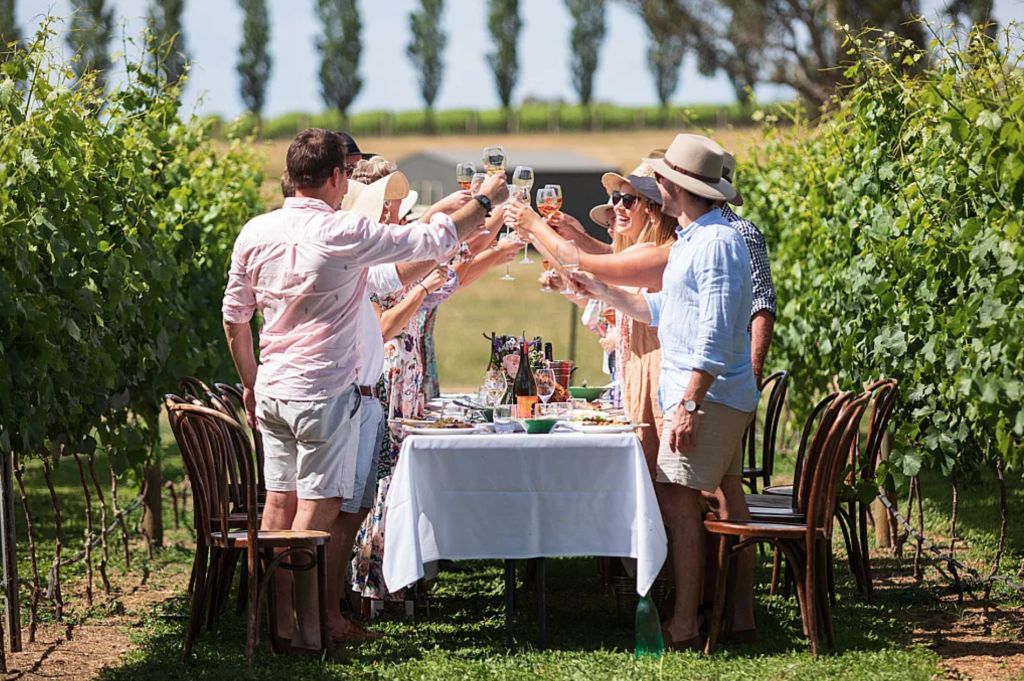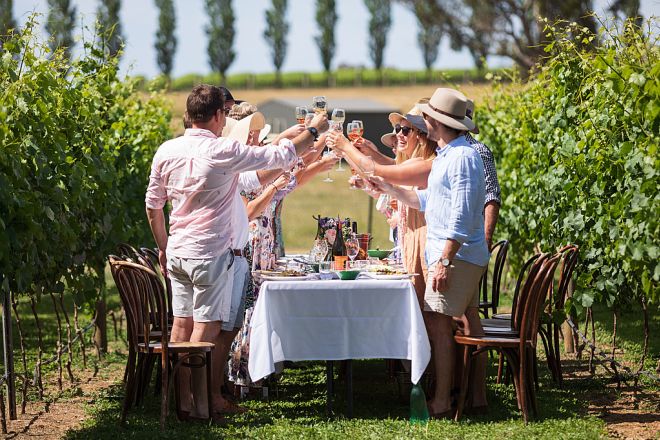The rolling hills surrounding the regional city of Orange have emerged as a premium wine destination, with one popular local vineyard and cellar door set to tempt wealthy tree-changers, investors and other winery owners.
Delicate and distinct, cool climate wines are bringing a culture of sophisticated wining and dining to Orange, located about four hours’ drive west of Sydney.
Alongside six varieties of grape on the vine, the buyers of Heifer Station Wines will also take custody of farm animals including Truffle the pig and Tilly the horse, and host a music festival with more than 10,000 attendees.
Vendors Michelle and Phillip Stivens bought the 33-hectare property in 1999, when it was overgrown and in a state of disrepair, having been locked up for five years.
“It hadn’t been pruned, harvested or sprayed,” Michelle Stivens recalls. “You wouldn’t even know a vineyard was there – it was overrun by blackberries.”
The Stivenses had planned to run cattle, but a steady stream of conversations with neighbours changed that. Locals kept congratulating the pair on buying one of the best-located vineyards in Orange.
“It’s got a beautiful undulation across the vineyard, which allows for great air flow,” says Michelle, adding it has the perfect balance of sunshine and elevation.
“It took us from 1999 to 2012 to actually tidy it up and get a crop out of it.”
With a background in management and real estate, Michelle and Phillip were no viticulture experts at the outset. But a focus on good farming practices – “soil health and plant health” – served them well. “That year we won a bronze medal for our shiraz, and we’ve just gone ahead in leaps and bounds.”
Running a cool climate vineyard at 900 metres above sea level comes with its challenges and rewards. “Our fruit takes longer to ripen than if we were growing grapes in the Hunter or Barossa Valley.”
While the harvest might wind up in January for the Hunter or Barossa, the Stivenses were still waiting for fruit to ripen in May.
“We still get the warm summers in Orange but it always cools down in the night time. The longer the grapes stay on the vine, the fruit flavours intensify and the tannin softens.”
Unlike most vineyards, the boutique and award-winning operation makes 85 per cent of its profit from its cellar door operations, offering huge scope to ramp up production and target the wholesale market.
The couple opened the cellar door in 2016 when, Michelle says, “Orange was becoming well-known as a premium cool climate wine destination.”
They had the enviable task of visiting several cellar doors in the region each weekend as part of market research. “We have family and friends that would love to come and visit Orange and they all have small children. But I would not have felt comfortable taking them to those cellar doors.”
They set out to “create a cellar door where kids aren’t saying ‘can we go now?'”
While parents enjoy a glass in an old woodshed converted into a rustic-chic cellar door, kids can pet the animals at the Funny Farm, or play an old-fashioned game of handball or bocce.
Michelle believes their family-friendly space has been their greatest business success, alongside the production of award-winning wine varieties including pinot noir, chardonnay, shiraz and pinot gris.
More recently, work was completed on a function centre with capacity for 350 guests, while the property has twice hosted the popular Day on the Green festival, attended by 10,000 festival-goers.
Rural sales specialist Stewart Murphy of Ray White Emms Mooney has the listing, with price expectations north of $5.5 million.
Murphy says the Orange area has “come to the forefront”.
“It’s a destination for tree-changers looking to relocate. But then it’s also a destination for weekenders wanting to experience what Orange has to offer,” he says.
“Cool climate wines have become the flavour of the month. That’s why we are seeing people from outside the area pursuing vineyards.”
Local vineyard owners are also expected to show interest in the property.
The rural market has steadied after years of rising farmland values. “Buyers have got more selection and are a bit more cautious,” Murphy says. “But good real estate still sells.”
With a management structure in place – including a general manager, winemaker and vineyard consultant – a new owner could “walk in and hit the ground running”.
Currently, 40 per cent of the grape harvest sells to other wineries, so the future owner could ramp up the production of ‘Heifer Station’ wines and seek to expand interstate or overseas.
While the Stivenses are selling off Heifer Station Wines to retire, they won’t be far away. They will retain the homestead and cattle grazing paddocks next door.
“We’re looking forward to wandering down the paddocks to the cellar door,” Michelle says.
Heifer Station Wines is for sale by tender, closing September 22.

